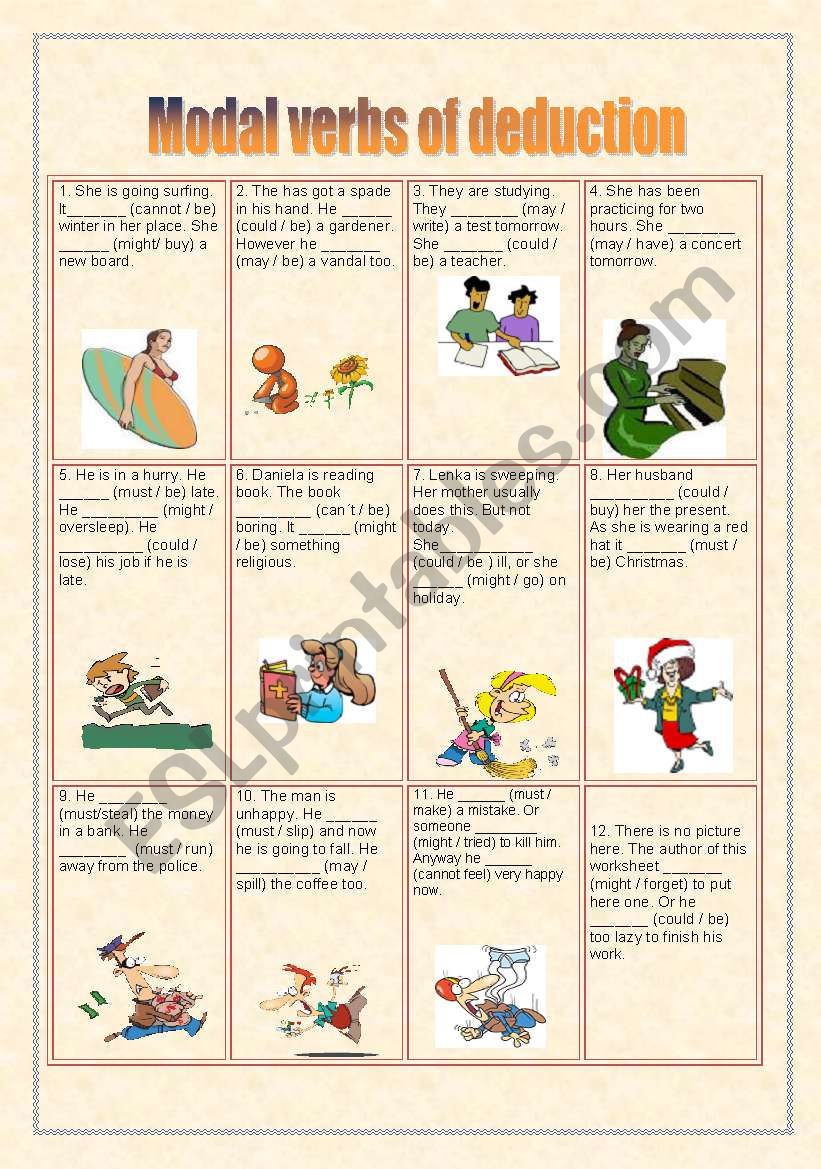
Modal verbs of deduction ESL worksheet by Zdenda
"Deduction" means using the information available to make a guess or draw a conclusion about the facts. Depending on the information available, you might be more certain that your conclusion is true, or less certain that your conclusion is true - and we use different modal verbs to indicate the degree of certainty. Let's look at some examples.
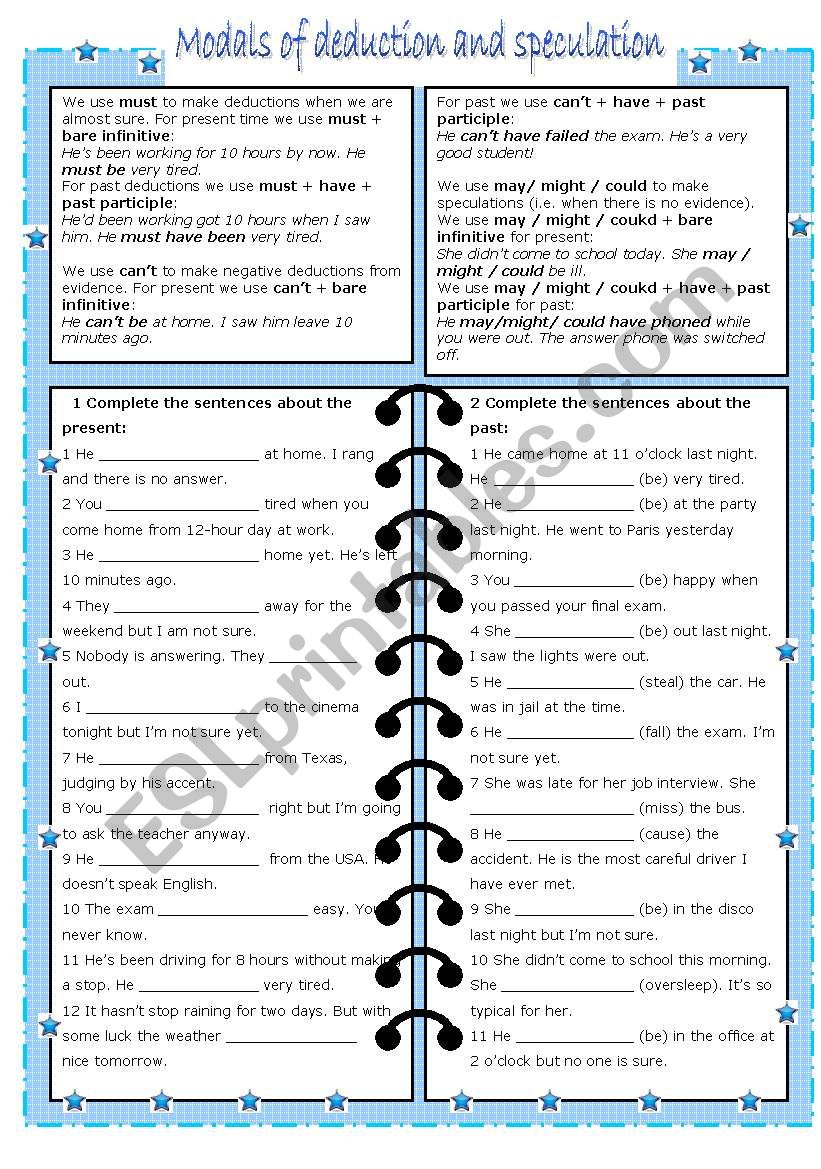
Past Modal Verbs Of Deduction Exercises Online degrees
Grammar test 1 Read the explanation to learn more. Grammar explanation We can use modal verbs for deduction - guessing if something is true using the available information. The modal verb we choose shows how certain we are about the possibility. This page focuses on making deductions about the present or future. must

Worksheet to review modals for logical deduction. The modals presented
The modals of deduction are used to indicate degrees of certainty or probability when making deductions or drawing conclusions about a situation or event. The English modal verbs "must", "have to","may", "might" "can't" and "couldn't" are used to express deduction and contention. Modal verbs are used to state how.
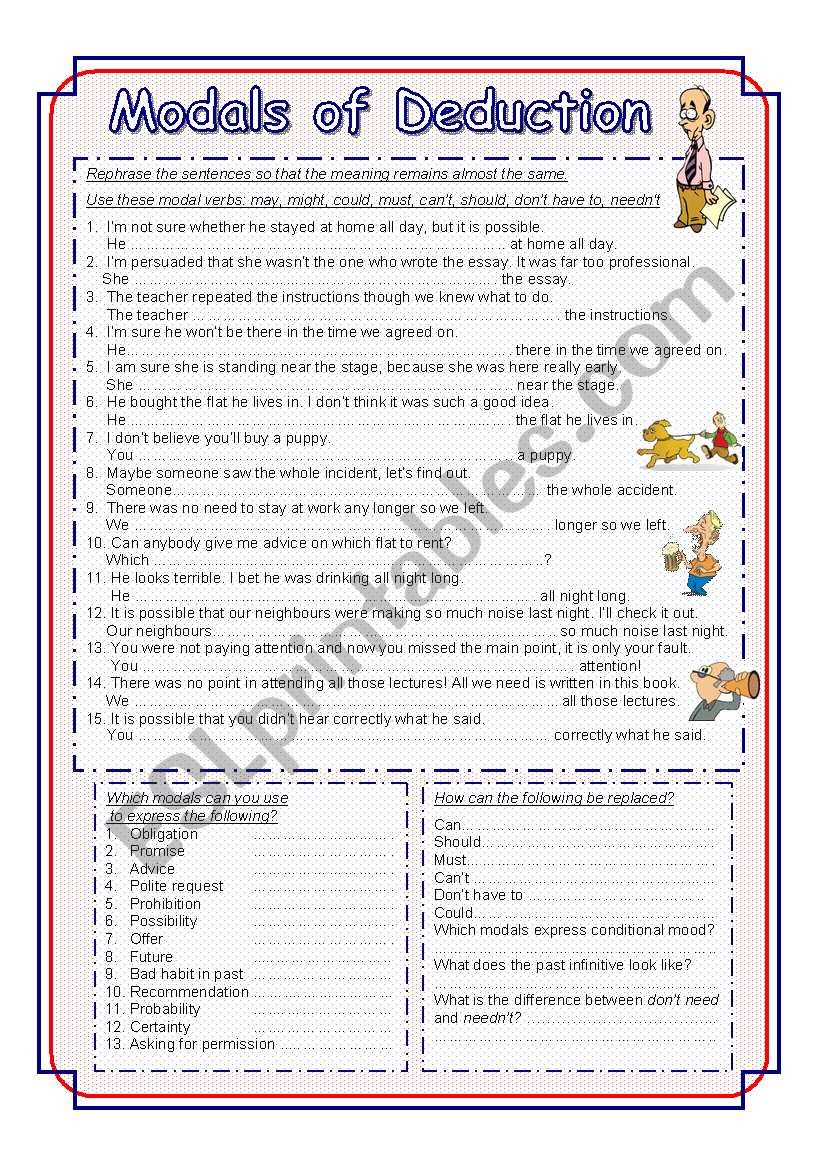
Modals of Deductions exercises ESL worksheet by mish.cz
A collection of downloadable worksheets, exercises and activities to teach Modals of deduction, shared by English language teachers.. Role play. (MODALS FOR PRESENT DEDUCTION - It must be/ It can�t be/ It could be/ It might be) Level: intermediate Age: 10-100 Downloads: 84 : Modals of deduction Level: intermediate Age: 18-100 Downloads.

PERFECT MODALS OF DEDUCTION worksheet in 2021 Grammar worksheets
What is Modals of Deduction? Modals of Deduction Examples and Exercises - GrammarSimple.Com Grammar Adverbs Adjectives Articles Conjunctions Conditionals Contractions Determiners Gerunds Infinitives Modal Verbs Prepositions Sentences Tenses Pronouns Vocabulary Abbreviations Animals Synonym Opposites Transition Words Collective Nouns Collocations

Grammar videos Modals of deduction exercises 1. Check your grammar
Instructions 0:00 / 2:57 720p Transcript We use the modal verbs might, may and could + an infinitive form without to when we think it is possible that something is true. We use must when we are sure it is true and can't when we are sure it isn't true. So we can use might, may and could for making guesses? Yes.

Modals of deduction present Interactive worksheet
Modal of deduction: must We use MUST when we have strong evidence and we are certain that something is true. You must be tired after such a long drive. She must be the new boss. I saw her in the boardroom. They must have been shopping. Look at all those bags! This window's smashed. The thieves must have climbed in here.
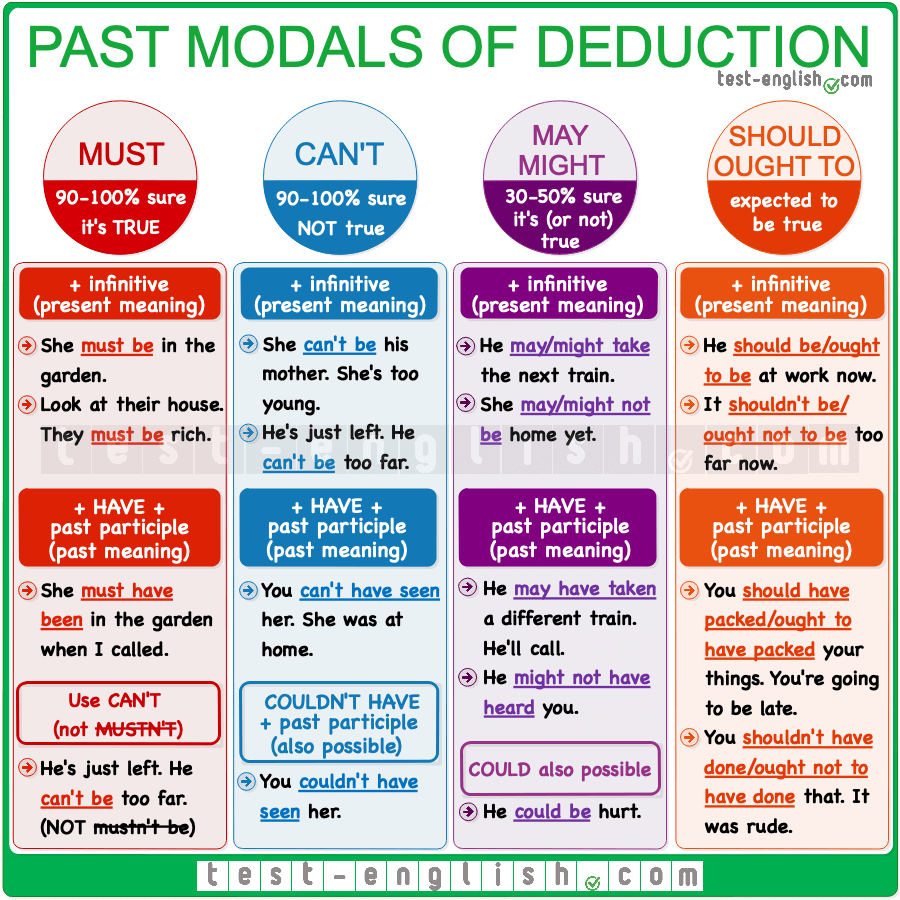
Past modal verbs of deduction TestEnglish
Modal verbs of deduction Modal verbs - short answers Ability: can - could - might. Have to, must, should Permission - obligation Offers and requests - exercises Possibility - modal verbs Ability - modal verbs exercises Advice - modal verbs exercises Can / must / should - tests next page - can / could - will / would must / have to

Modal verbs of deduction must, might, could, can’t TestEnglish
Advanced Grammar Exercise: Modals of Deduction For each sentence, choose between can't, might or must to fill each space. 1. Your mother be a great cook. You are always so keen to get back home to eat! 2. I don't know why I am so tired these days. I be working too hard. Or maybe I am not sleeping too well. 3. Do you know where Carl is?

MODALS OF DEDUCTIONS AND SPECULATION English vocabulary words
Exercise 1 Choose all the correct modal verbs of deduction for each gap below. In some sentences there are TWO possible correct answers. Page 1 of 2 1 Paul is behaving in a very unusual way. I think he ______ again. a. can't drink b. can be drinking c. might be drinking 2 I think there ______ a mistake in your tax return. You should check it.

Modal Verbs of DEDUCTION My Lingua Academy
We can use modal verbs for deduction - guessing if something is true using the available information. The modal verb we choose shows how certain we are about the possibility. This page focuses on making deductions about the past. must have We use must have + past participle when we feel sure about what happened.
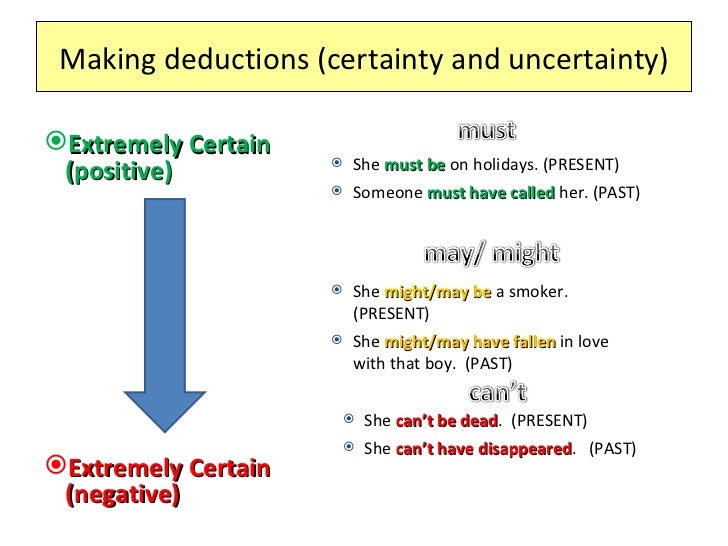
My English Blackboard MODAL VERBS OF DEDUCTION
Grammar videos: Modals of deduction - exercises Watch the video on our website and read the conversation between Sophie and Nur. Then do these exercises to check your understanding of modals of deduction. 1. Check your grammar: matching Draw a line to match the sentences that have the same meaning. I'm sure that's Katie.

Modal Verbs of Deduction Worksheet for 4th 6th Grade Lesson
Modals of deduction (past) SB page 89 6 Match the sentences. 1 She must have been happy. 2 She can't have been happy. 3 She might have been happy. 4 He must have been hungry. 5 He can't have been hungry. 6 He could have been hungry. a Her husband crashed her car again. b He ate everything. c But he was too polite to ask for any food.
.jpg)
модальные глаголы дедукции в английском языке
Click here for all the exercises about modal verbs. We can use these modal verbs (also called modals of deduction, speculation or certainty) when we want to make a guess about something. We choose the verb depending on how sure we are. 1: Talking about the present: must / might / could / may / can't + infinitive

29 Deduction English ESL worksheets pdf & doc
Students > English File > Intermediate third edition > Grammar > File 6 > Lesson B modals of deduction: might, can't, must (2) Grammar. Vocabulary. Pronunciation. Practical English. Downloads. Mini Phrasebook. Learning Record. → File 01.

Modals of Deduction Worksheet Deduction, Verb worksheets, Worksheets
Quiz - Lesson 10: Modal Verbs for Deduction Exercise 1 - Complete the blanks with must, can't, or might: 1. Look at that guy's enormous muscles. He _____ work out a lot. 2. Michelle _____ want to participate in the festival - it seems like the type of thing she'd be interested in. Why don't you ask her? 3.